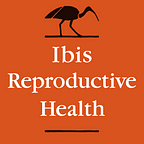Webinar recap: Investing in women’s sexual and reproductive health
This piece was authored by Sesona Buyeye, who is a Communications Assistant at Ibis Reproductive Health’s Johannesburg, South Africa office.
The 8th of March 2024 marked the annual International Women’s Day, a globally recognized occasion to celebrate the achievements and contributions of women worldwide. The United Nations (UN) announced the theme for this year to be “Invest in Women: Accelerate Progress.” Embracing the spirit of this theme, the mmoho Campaign, a sexual and reproductive health advocacy campaign founded by Ibis Reproductive Health’s Africa Region office and its partners, and AMAZE Africa collaborated to host a webinar aligned to the UN global theme.
The webinar fostered dialogue and insights on the need to invest in women’s sexual and reproductive health (SRH). Speakers delved into conversations to raise awareness about the importance of empowering women and highlighted how investing in women’s SRH contributes to overall community wellbeing and development.
One of the panellists, Ngaatendwe Murombedzi, the Southern Africa Regional Advocacy, Policy and Marketing Manager at Aids Healthcare Foundation (AHF), emphasised how the stigma that many women and girls experience when accessing SRH services can negatively impact their mental health. She highlighted AHF’s perspective that investing in women and girls is one way to address the intersections between HIV/AIDS and other psychosocial challenges that women and girls face.
Ms. Murombedzi further explained that cultural influences and gender expression can significantly impact young people’s health-seeking behaviours and access to contraceptives. This cultural context can lead young people to avoid preventative measures against HIV/AIDS and STIs out of fear of stigmatisation by healthcare workers. Young women seeking SRH services often encounter judgment and stigma, leading to feelings of discouragement and depression. Moreover, young women unable to access SRH services are at increased risk of unintended pregnancy. Ms. Murombedzi emphasised the importance of implementing multi-pronged interventions tailored to accommodate young people’s realities and effectively support their mental health.
Panellist Dr. Jess Rucell, an Expert Advisor on Gender Justice at The Centre for Applied Legal Studies and a board member of the Sexual Reproductive Justice Coalition (SRJC), outlined the SRH landscape in South Africa, emphasising its constitutionally protected right to reproductive health. She explained that their understanding of SRH implies that people are able to have a satisfying and safe sex life, have the capability to reproduce, and have the freedom to decide if, when, and how often to do so. Unfortunately, this is not a reality for everyone in South Africa.
Dr. Rucell also highlighted the prevalence of obstetric violence, including coerced medical interventions and sterilisations, and its impact on HIV-positive women in particular. Although the South African maternal, perinatal and neonatal health policy, released in 2021, prioritises dignified maternity care to address abuses faced by women in public health facilities, policy and implementation gaps remain. Dr. Rucell stressed the need for in-person training of health care staff on these guidelines and encouraged patients to report abuse and maltreatment to the Office of Health Ombud in South Africa.
Kelly Blanchard, President of Ibis Reproductive Health outlined the fragmented and profit-driven nature of the United States of America’s (USA) health care system, which has resulted in an ineffective, unjust system that does not meaningfully support people’s sexual and reproductive health and rights (SRHR). Despite being one of the world’s wealthiest nations, the USA has the highest maternity mortality rate among OECD nations, with Black women experiencing mortality rates 3–4 times higher than white women. Until 2022, the right to abortion access was protected by the landmark 1973 Roe v. Wade Supreme Court decision. However, the US Supreme Court’s 2022 decision in Dobbs v. Jackson Women’s Health Organisation overturned Roe v. Wade, allowing states to restrict abortion care. As of April 2024, 14 states have implemented total abortion bans and 27 states have abortion bans based on gestational duration. The global impact of this court ruling has in some instances extended beyond the USA, influencing SRHR funding and policy development worldwide. This is evidenced in a report by Fos Feminista which details the court ruling’s impact on abortion laws and movements globally.
Panellist Gugulethu Sihlali, a Youth Advisory Panel member at the UNFPA, underscored the importance of prioritising young people’s access to SRH care. She mentioned that the UNFPA’s commitment to taking proactive youth-led policy actions involves the deliberate inclusion of young people in the formulation of policy geared toward access to SRH services for adolescents and youth.
Ms. Sihlali pointed out that when young people are excluded from decision-making processes, the decisions often lack the required depth needed to comprehensively address the challenges young people face. In such instances, policies remain theoretical concepts that fail to translate into tangible benefits for their intended beneficiaries. Additionally, Ms. Sihlali highlighted that while monetary investment is undoubtedly crucial, it is equally important to redistribute power dynamics and provide meaningful platforms for the voices of young people and women in decision-making spaces, especially in improved access to SRH services. By ensuring active youth participation and representation, decision-makers can harness the diverse perspectives and innovative ideas of young people and foster more inclusive and effective policies.
Ms. Sihlali’s presentation underscored the urgent need to prioritise the involvement of young people in shaping their own futures, advocating for their rights, and ensuring that policies are not just theoretical constructs but actionable frameworks that truly benefit and empower them and their SRH needs.
Each speaker reinforced the importance of investing in women’s SRH to drive positive societal change. They outlined a clear need for tailored interventions to address the intersectionality of gender, healthcare access, and societal norms, and their impact on issues like HIV/AIDS, mental health, and obstetric violence among women and girls. Moreover, they highlighted the need for inclusive policies and active youth participation in decision-making processes to ensure more comprehensive and effective solutions. The shared insights serve as a call to action to prioritise women’s SRH investment and advocate for inclusive policies that empower women, girls and youth globally.
